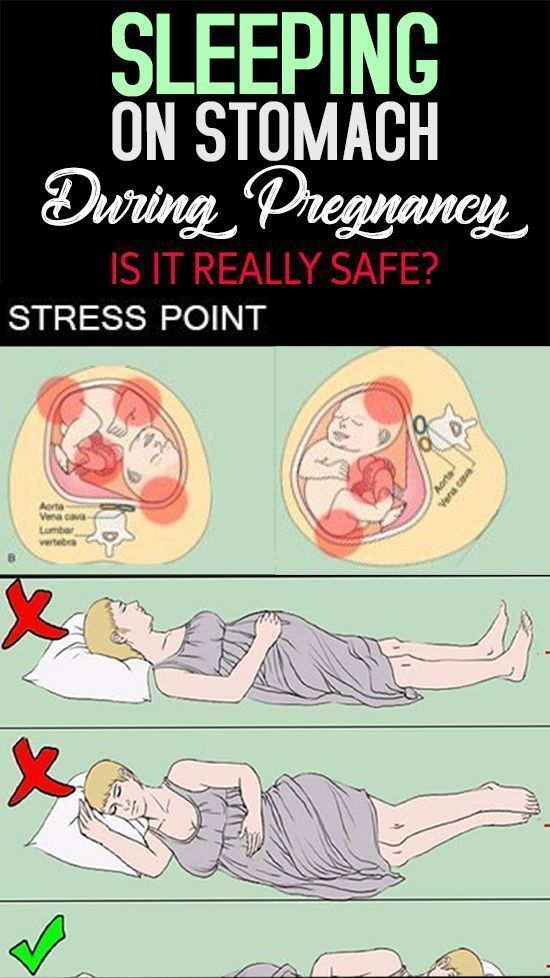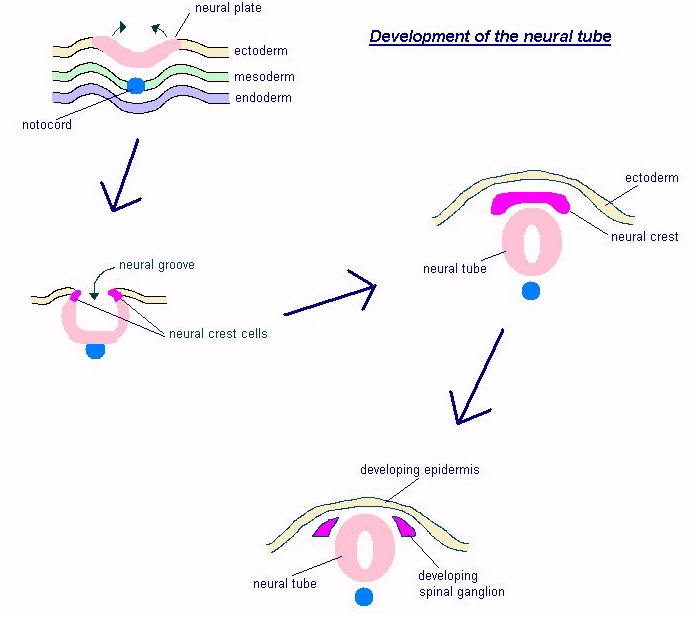Sleeping position in pregnancy second trimester
Sleeping While Pregnant: Second Trimester
1.
Medical Encyclopedia: A.D.A.M Medical Encyclopedia. (2019, June 30). Morning sickness. Retrieved August 24, 2020, from https://medlineplus.gov/ency/article/003119.htm
2.
Medical Encyclopedia: A.D.A.M Medical Encyclopedia. (2018, October 30). Breast pain. Retrieved August 24, 2020, from https://medlineplus.gov/ency/article/003152.htm
3.
Reid, K. J., Facco, F. L., Grobman, W. A., Parker, C. B., Herbas, M., Hunter, S., Silver, R. M., Basner, R. C., Saade, G. R., Pien, G. W., Manchanda, S., Louis, J. M., Nhan-Chang, C. L., Chung, J. H., Wing, D. A., Simhan, H. N., Haas, D. M., Iams, J., Parry, S., & Zee, P. C. (2017). Sleep During Pregnancy: The nuMoM2b Pregnancy and Sleep Duration and Continuity Study. Sleep, 40(5), zsx045. https://doi.org/10.1093/sleep/zsx045
4.
Supakatisant, C., & Phupong, V. (2015). Oral magnesium for relief in pregnancy-induced leg cramps: a randomised controlled trial. Maternal & child nutrition, 11(2), 139–145. https://doi.org/10.1111/j.1740-8709.2012.00440.x
5.
Cherni, Y., Desseauve, D., Decatoire, A., Veit-Rubinc, N., Begon, M., Pierre, F., & Fradet, L. (2019). Evaluation of ligament laxity during pregnancy. Journal of gynecology obstetrics and human reproduction, 48(5), 351–357. https://doi.org/10.1016/j.jogoh.2019.02.009
6.
Casagrande, D., Gugala, Z., Clark, S. M., & Lindsey, R. W. (2015). Low Back Pain and Pelvic Girdle Pain in Pregnancy. The Journal of the American Academy of Orthopaedic Surgeons, 23(9), 539–549. https://doi.org/10.5435/JAAOS-D-14-00248
7.
Martin-Fairey, C. A., Zhao, P., Wan, L., Roenneberg, T., Fay, J., Ma, X., McCarthy, R., Jungheim, E. S., England, S. K., & Herzog, E. D. (2019). Pregnancy Induces an Earlier Chronotype in Both Mice and Women. Journal of biological rhythms, 34(3), 323–331. https://doi.org/10.1177/0748730419844650
8.
Sandoe, C. H., & Lay, C. (2019). Secondary Headaches During Pregnancy: When to Worry. Current neurology and neuroscience reports, 19(6), 27. https://doi.org/10.1007/s11910-019-0944-9
9.
Gilbey, P., McGruthers, L., Morency, A. M., & Shrim, A. (2012). Rhinosinusitis-related quality of life during pregnancy. American journal of rhinology & allergy, 26(4), 283–286. https://doi.org/10.2500/ajra.2012.26.3776
10.
Ferdinande, K., Dorreman, Y., Roelens, K., Ceelen, W., & De Looze, D. (2018). Anorectal symptoms during pregnancy and postpartum: a prospective cohort study. Colorectal disease : the official journal of the Association of Coloproctology of Great Britain and Ireland, 20(12), 1109–1116. https://doi.org/10.1111/codi.14324
11.
Medical Encyclopedia: A.D.A.M Medical Encyclopedia. (2018, September 25). Common symptoms during pregnancy. Retrieved August 24, 2020, from https://medlineplus.gov/ency/patientinstructions/000583.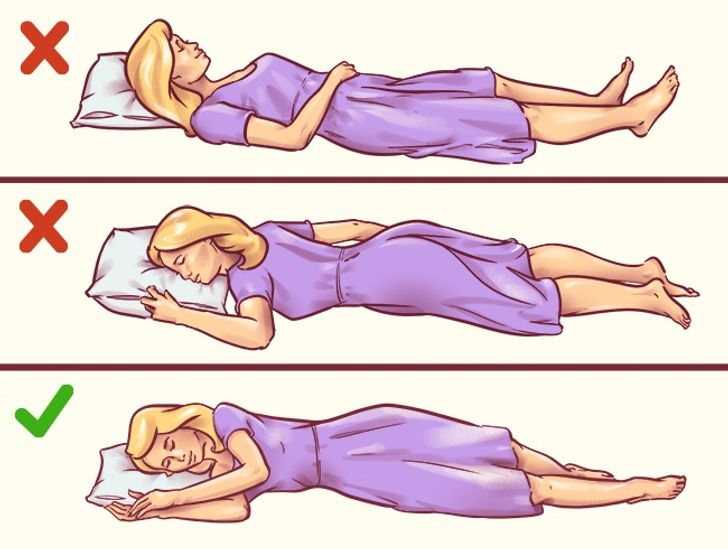 htm
htm
12.
The American College of Obstetricians and Gynecologists. (2018, April). How Your Fetus Grows During Pregnancy. Retrieved August 24, 2020, from https://www.acog.org/patient-resources/faqs/pregnancy/how-your-fetus-grows-during-pregnancy
13.
Rawal, S., Hinkle, S. N., Zhu, Y., Albert, P. S., & Zhang, C. (2017). A longitudinal study of sleep duration in pregnancy and subsequent risk of gestational diabetes: findings from a prospective, multiracial cohort. American journal of obstetrics and gynecology, 216(4), 399.e1–399.e8. https://doi.org/10.1016/j.ajog.2016.11.1051
14.
Gao, M., Hu, J., Yang, L., Ding, N., Wei, X., Li, L., Liu, L., Ma, Y., & Wen, D. (2019). Association of sleep quality during pregnancy with stress and depression: a prospective birth cohort study in China. BMC pregnancy and childbirth, 19(1), 444. https://doi.org/10.1186/s12884-019-2583-1
15.
Okun, M. L., Kline, C.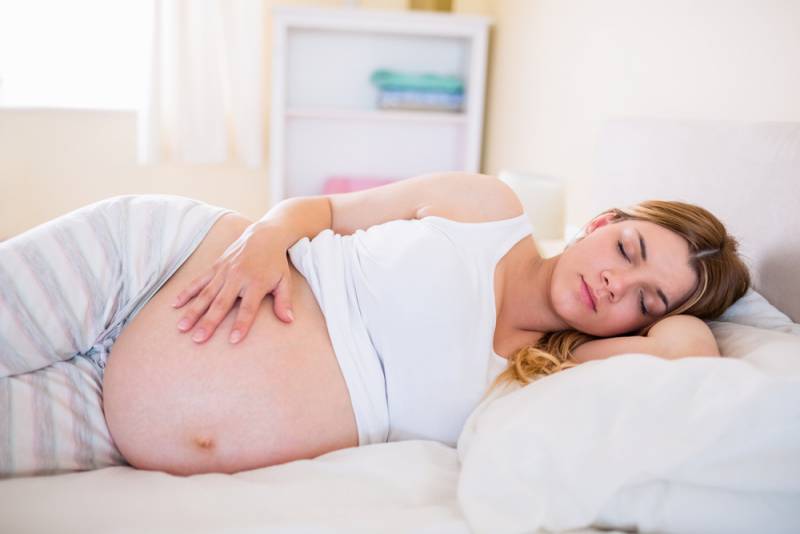 E., Roberts, J. M., Wettlaufer, B., Glover, K., & Hall, M. (2013). Prevalence of sleep deficiency in early gestation and its associations with stress and depressive symptoms. Journal of women's health (2002), 22(12), 1028–1037. https://doi.org/10.1089/jwh.2013.4331
E., Roberts, J. M., Wettlaufer, B., Glover, K., & Hall, M. (2013). Prevalence of sleep deficiency in early gestation and its associations with stress and depressive symptoms. Journal of women's health (2002), 22(12), 1028–1037. https://doi.org/10.1089/jwh.2013.4331
16.
Tsai, S. Y., Lee, P. L., Lin, J. W., & Lee, C. N. (2016). Cross-sectional and longitudinal associations between sleep and health-related quality of life in pregnant women: A prospective observational study. International journal of nursing studies, 56, 45–53. https://doi.org/10.1016/j.ijnurstu.2016.01.001
17.
Na-Rungsri, K., Lertmaharit, S., Lohsoonthorn, V., Totienchai, S., & Jaimchariyatam, N. (2016). Obstructive sleep apnea and the risk of preterm delivery. Sleep & breathing = Schlaf & Atmung, 20(3), 1111–1117. https://doi.org/10.1007/s11325-016-1339-7
18.
Jaimchariyatam, N., Na-Rungsri, K., Tungsanga, S., Lertmaharit, S., Lohsoonthorn, V.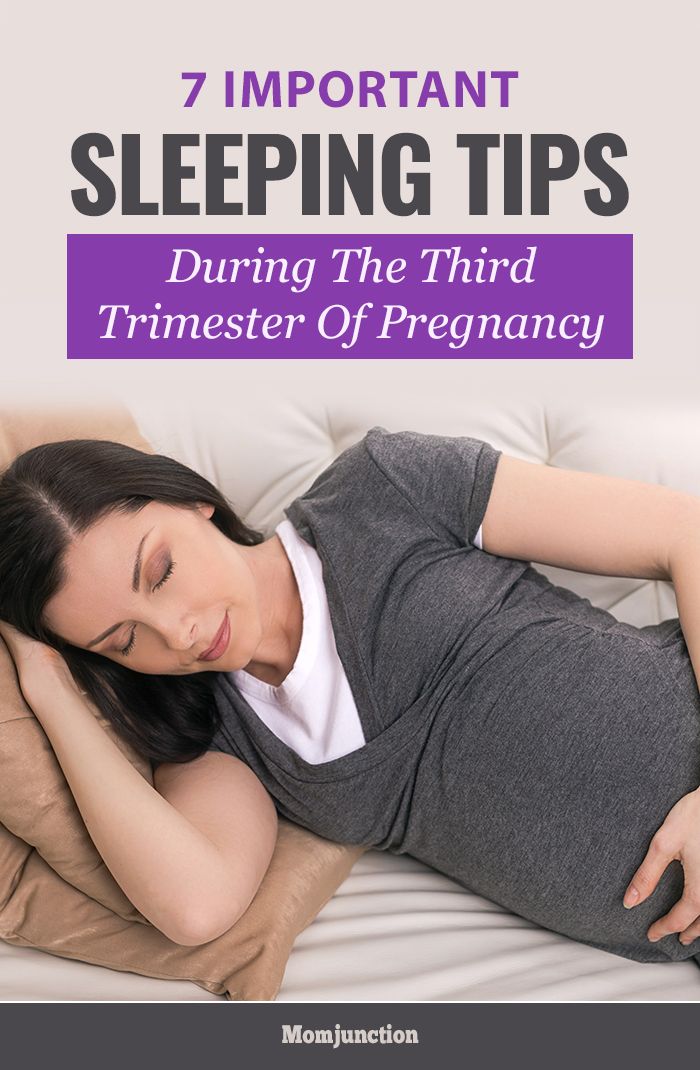 , & Totienchai, S. (2019). Obstructive sleep apnea as a risk factor for preeclampsia-eclampsia. Sleep & breathing = Schlaf & Atmung, 23(2), 687–693. https://doi.org/10.1007/s11325-018-1758-8
, & Totienchai, S. (2019). Obstructive sleep apnea as a risk factor for preeclampsia-eclampsia. Sleep & breathing = Schlaf & Atmung, 23(2), 687–693. https://doi.org/10.1007/s11325-018-1758-8
19.
Reutrakul, S., Zaidi, N., Wroblewski, K., Kay, H. H., Ismail, M., Ehrmann, D. A., & Van Cauter, E. (2013). Interactions between pregnancy, obstructive sleep apnea, and gestational diabetes mellitus. The Journal of clinical endocrinology and metabolism, 98(10), 4195–4202. https://doi.org/10.1210/jc.2013-2348
20.
Rossi, A., Cornette, J., Johnson, M. R., Karamermer, Y., Springeling, T., Opic, P., Moelker, A., Krestin, G. P., Steegers, E., Roos-Hesselink, J., & van Geuns, R. J. (2011). Quantitative cardiovascular magnetic resonance in pregnant women: cross-sectional analysis of physiological parameters throughout pregnancy and the impact of the supine position. Journal of cardiovascular magnetic resonance : official journal of the Society for Cardiovascular Magnetic Resonance, 13(1), 31.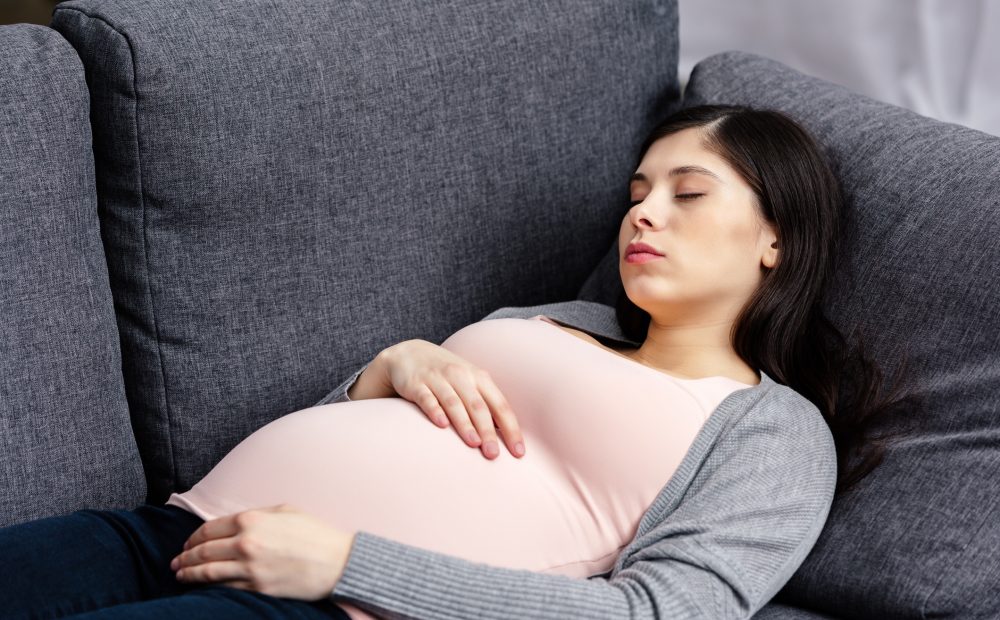 https://doi.org/10.1186/1532-429X-13-31
https://doi.org/10.1186/1532-429X-13-31
21.
Silver, R. M., Hunter, S., Reddy, U. M., Facco, F., Gibbins, K. J., Grobman, W. A., Mercer, B. M., Haas, D. M., Simhan, H. N., Parry, S., Wapner, R. J., Louis, J., Chung, J. M., Pien, G., Schubert, F. P., Saade, G. R., Zee, P., Redline, S., Parker, C. B., & Nulliparous Pregnancy Outcomes Study: Monitoring Mothers-to-Be (NuMoM2b) Study (2019). Prospective Evaluation of Maternal Sleep Position Through 30 Weeks of Gestation and Adverse Pregnancy Outcomes. Obstetrics and gynecology, 134(4), 667–676. https://doi.org/10.1097/AOG.0000000000003458
22.
Effati-Daryani, F., Mohammad-Alizadeh-Charandabi, S., Mirghafourvand, M., Taghizadeh, M., Bekhradi, R., & Zarei, S. (2018). Effect of Lavender cream with or without footbath on sleep quality and fatigue in pregnancy and postpartum: a randomized controlled trial. Women & health, 58(10), 1179–1191. https://doi.org/10.1080/03630242.2017.1414101
23.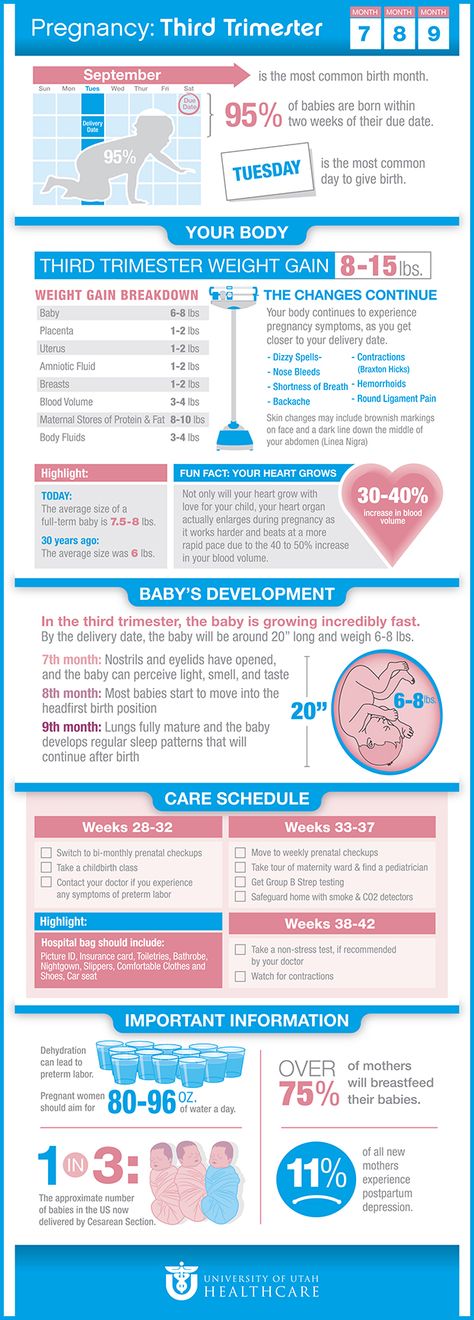
OʼConnor, P. J., Poudevigne, M. S., Johnson, K. E., Brito de Araujo, J., & Ward-Ritacco, C. L. (2018). Effects of Resistance Training on Fatigue-Related Domains of Quality of Life and Mood During Pregnancy: A Randomized Trial in Pregnant Women With Increased Risk of Back Pain. Psychosomatic medicine, 80(3), 327–332. https://doi.org/10.1097/PSY.0000000000000559
24.
Gjestland, K., Bø, K., Owe, K. M., & Eberhard-Gran, M. (2013). Do pregnant women follow exercise guidelines? Prevalence data among 3482 women, and prediction of low-back pain, pelvic girdle pain and depression. British journal of sports medicine, 47(8), 515–520. https://doi.org/10.1136/bjsports-2012-091344
25.
Watelain, E., Pinti, A., Doya, R., Garnier, C., Toumi, H., & Boudet, S. (2017). Benefits of physical activities centered on the trunk for pregnant women. The Physician and sportsmedicine, 45(3), 293–302. https://doi.org/10.1080/00913847.2017.1351286
26.
Crowley, S. K., O'Buckley, T. K., Schiller, C. E., Stuebe, A., Morrow, A. L., & Girdler, S. S. (2016). Blunted neuroactive steroid and HPA axis responses to stress are associated with reduced sleep quality and negative affect in pregnancy: a pilot study. Psychopharmacology, 233(7), 1299–1310. https://doi.org/10.1007/s00213-016-4217-x
27.
Latendresse, G., & Ruiz, R. J. (2010). Maternal coping style and perceived adequacy of income predict CRH levels at 14-20 weeks of gestation. Biological research for nursing, 12(2), 125–136. https://doi.org/10.1177/1099800410377111
28.
Solomonova, E., Lee, Y., Robins, S., King, L., Feeley, N., Gold, I., Hayton, B., Libman, E., Nagy, C., Turecki, G., & Zelkowitz, P. (2019). Sleep quality is associated with vasopressin methylation in pregnant and postpartum women with a history of psychosocial stress. Psychoneuroendocrinology, 107, 160–168. https://doi.org/10.1016/j.psyneuen.2019.05.010
Best Sleeping Positions While Pregnant
The best sleep position during pregnancy is “SOS” (sleep on side) because it provides the best circulation for you and your baby.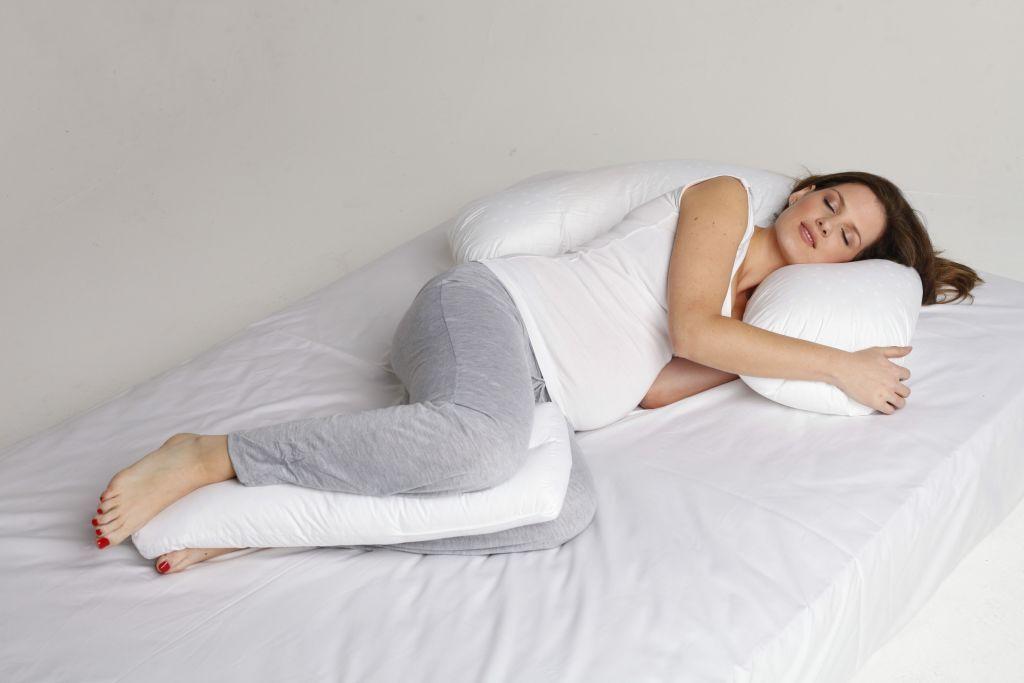 It also places the least pressure on your veins and internal organs. Sleeping on your left side will increase the amount of blood and nutrients that reach the placenta and your baby. Plus good circulation helps reduce potential swelling, varicose veins in your legs and hemorrhoids.
It also places the least pressure on your veins and internal organs. Sleeping on your left side will increase the amount of blood and nutrients that reach the placenta and your baby. Plus good circulation helps reduce potential swelling, varicose veins in your legs and hemorrhoids.
How Can I Sleep More Comfortably During Pregnancy?
Keep your legs and knees bent, and put a pillow between your legs to relieve the stress on your back.
- If you find that you are having problems with back pain, use the “SOS” position, and try placing a pillow under your abdomen as well.
- If you are experiencing heartburn during the night, you may want to try propping your upper body with pillows.
- In late pregnancy, you may experience shortness of breath. Try lying on your side or propped up with pillows.
These suggestions may not sound completely comfortable, especially if you are used to sleeping on your back or stomach, but try them out. You may find that they work.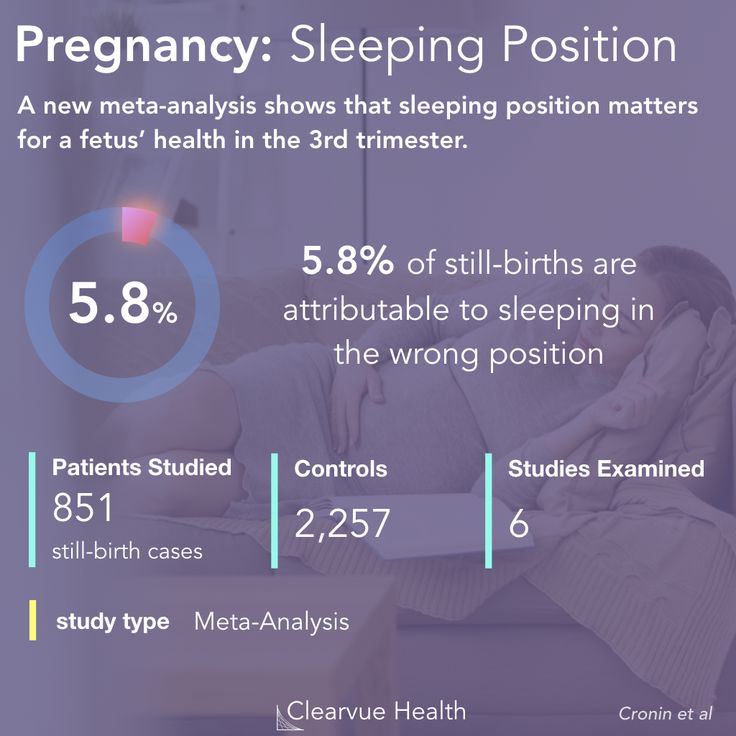 Keep in mind that you may not stay in one position all night, and rotating positions is fine.
Keep in mind that you may not stay in one position all night, and rotating positions is fine.
What Sleep Positions During Pregnancy Should I Avoid?
Sleeping on your back: This can cause problems with backaches, breathing, the digestive system, hemorrhoids, low blood pressure and cause a decrease in circulation to your heart and your baby. This is a result of your growing abdomen resting on your intestines and major blood vessels (the aorta and vena cava). You can also develop sleep apnea as you put on weight.
Sleeping on your stomach: When you are farther along in your pregnancy, your breasts become more tender and your abdomen continues to grow, both making sleeping on your tummy uncomfortable. Using a donut-shaped pillow (with a hole in the middle) may help you sleep comfortably on your stomach.
Reasons for your discomfort may include:
During pregnancy, you may find yourself wrestling in bed trying to get comfortable before falling asleep. When you are pregnant your body goes through a variety of changes causing your regular sleeping positions to no longer work for you.
When you are pregnant your body goes through a variety of changes causing your regular sleeping positions to no longer work for you.
- Increased size of the abdomen
- Back pain
- Heartburn
- Shortness of breath
- Insomnia
More Steps to Sleeping Better While Pregnant
- Limit caffeine. Try not to drink coffee or caffeinated tea after 3 p.m.
- Brink plenty of water. Drink lot of water through out the day, but limit intake a couple of hours before bedtime so you don’t have to wake up and go to the bathroom.
- Exercise for 30 minutes. Exercise helps you sleep better, but don’t exercise within four hours of bedtime.
- Relaxing activities. A warm bath, foot or shoulder massage will help you relax.
- Peaceful bedroom. Keeping your bedroom dark, quiet and cool at night will help to drift off to sleep and stay asleep.
- 7 Discomforts of Pregnancy
- Nighfood Nighttime Ice Cream
- Pregnancy Week 15
Compiled using information from the following sources:
1.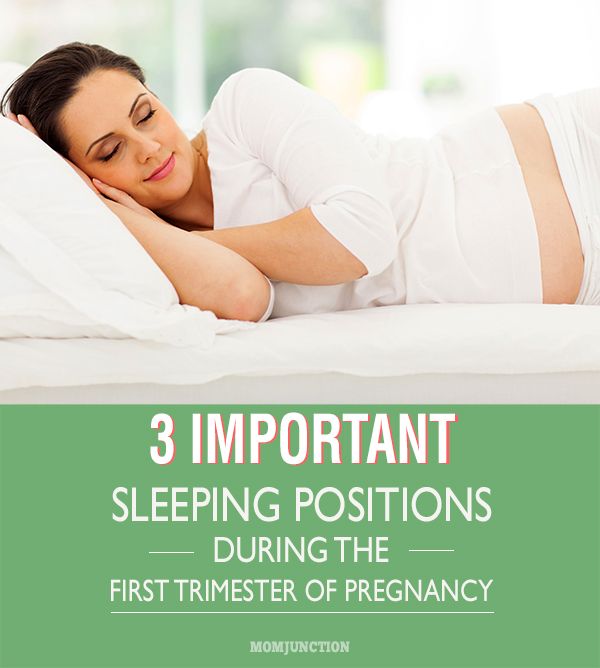 Nemours Foundation
Nemours Foundation
https://www.kidshealth.org
1. Your Pregnancy Week by Week Fifth Ed. Curtis, Glade B., OB/GYN, et al. Week 16
How to sleep during pregnancy
It is difficult to overestimate the role of sleep in the life of every person. A complete healthy rest allows you to fully restore the functioning of the nervous system, relieve stress, improve performance and increase activity. Chronic sleep deprivation is the cause of many diseases. What can we say about a woman who is at the stage of bearing a baby. During this period, more than ever, she needs a healthy, long and full sleep. However, unfortunately, it is during this period that one can only dream of a restful sleep.
As soon as a woman finds out about her new position, she has to give up a lot for the sake of the health of her unborn baby. And you need to give up not only bad habits: alcohol, cigarettes, coffee, but also from a comfortable sleep.
The cause of insomnia can be :
- Anxiety;
- Frequent urination;
- Fears and phobias before a new stage of one's life;
- Nervousness and irritability;
- Digestive disorder;
- Toxicosis;
- Physical indisposition;
- Uncomfortable posture.
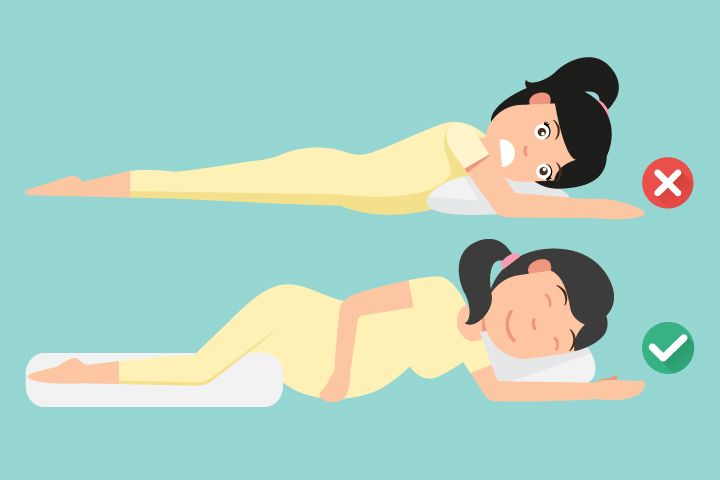
During the period of bearing a child, the female body experiences an extraordinary load, especially in the last trimester. The need for more sleep increases, because the body expends much more energy. Therefore, healthy sleep and pregnancy are inextricably linked.
As soon as a woman finds out about her new position, she has to give up a lot for the sake of the health of her unborn baby. And you need to give up not only bad habits: alcohol, cigarettes, coffee, but also from a comfortable sleep.
Let's try to figure out how to sleep during pregnancy, so as not only not to harm the health of your unborn baby, but to sleep well.
Looking for a comfortable sleeping position
Each person has his own favorite position, in which it is easy to fall asleep and sleep. Many do not imagine a comfortable rest on their backs, accustomed to sleeping on their stomachs. This habit will have to be sacrificed, as it is unsafe for the normal development of the fetus.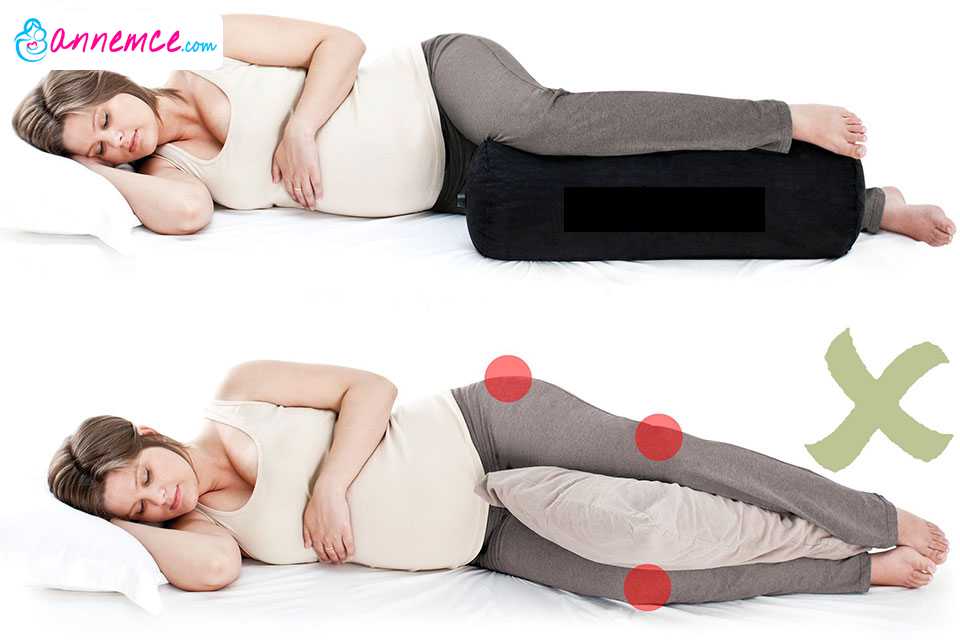 If in the first three months of pregnancy a woman can still sleep in the position in which she is used to and feels comfortable, then after the first trimester the growing belly will not allow her to lie safely in this position. Despite the natural protection of the baby in the form of amniotic fluid, there is a high probability of injuring the baby in a dream, squeezing it. But what is the right way to sleep during pregnancy?
If in the first three months of pregnancy a woman can still sleep in the position in which she is used to and feels comfortable, then after the first trimester the growing belly will not allow her to lie safely in this position. Despite the natural protection of the baby in the form of amniotic fluid, there is a high probability of injuring the baby in a dream, squeezing it. But what is the right way to sleep during pregnancy?
Back position
Even if you are used to sleeping in a Spartan position, on your back, with your arms spread wide, from the 28th week you will have to radically change your lifestyle. The fact is that as the fetus grows, the load on the intestines and vena cava will increase significantly, blocking the access of oxygen to the baby.
As soon as a woman finds out about her new position, she has to give up a lot for the sake of the health of her unborn baby. And you need to give up not only bad habits: alcohol, cigarettes, coffee, but also from a comfortable sleep.
If you sleep on your back during pregnancy, you may experience the following problems:
- Dizziness;
- Nausea;
- Convulsions;
- Numb limbs;
- Pressure reduction;
- Hemorrhoids;
- Heaviness of breathing.
If you feel these symptoms or the baby gives persistent signals, you need to urgently change your position, so squeezing the vena cava is fraught not only with poor health for the mother, but also with a lack of oxygen supply to the fetus.
Stomach position
One of the most beloved positions for many people, which allows you to quickly fall asleep while hugging a pillow. Many women, as soon as they find out about the change in their lives, are interested in the question, is it possible to sleep on your stomach during pregnancy? Doctors recommend abandoning this position already in the first weeks, even before the enlarged belly makes it impossible to fall asleep peacefully.
If you are afraid during sleep, without controlling your movements, to arbitrarily roll over on your stomach, you can put a large pillow that does not allow you to change position.
Side position
In order to normalize your sleep and not harm the health of the baby, experts recommend sleeping on your side during pregnancy. And if at first this option seems unacceptable to many, after the second trimester, lying on your side is the only possible one. But here the question arises, on which side to sleep in order to ensure the safety of the fetus?
Sleeping on the right side can cause squeezing of the kidney, which can have dire consequences. The ideal posture is lying on the left side. Thus, you not only do not injure the unborn baby, but also improve blood flow along with oxygen to the placenta.
But one should not ignore the individual characteristics of each organism and the position of the fetus in the uterus. When the baby is in a transverse position, choose the side where the baby's head is. And with a breech presentation, doctors recommend changing the position several times a night.
If you still cannot improve your sleep, you feel unwell and you are tormented by insomnia, then it is better to consult a specialist.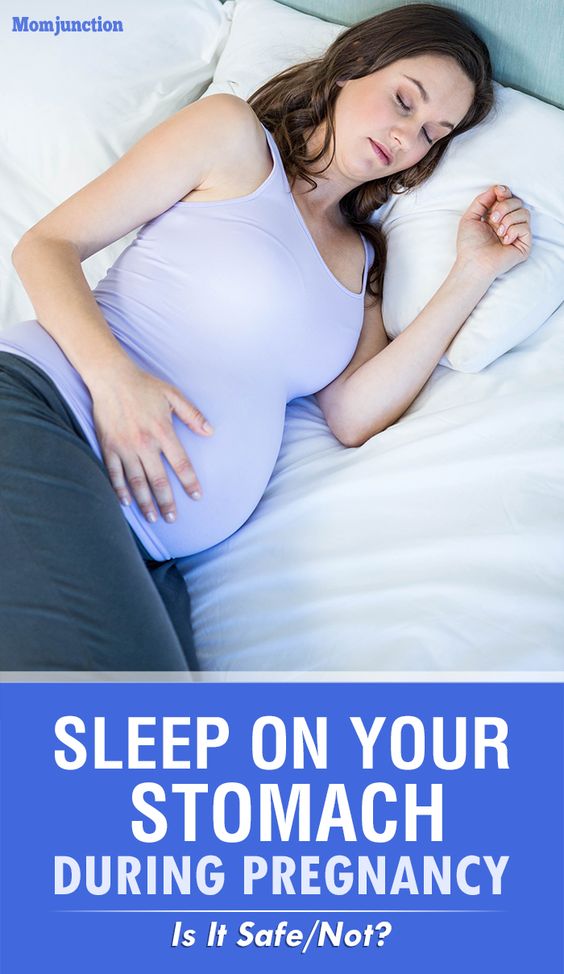 A good gynecologist will analyze the situation and help solve the problem. If necessary, he will prescribe a safe sedative that stabilizes the emotional state and helps to fall asleep calmly, resting and restoring the nervous system in a dream.
A good gynecologist will analyze the situation and help solve the problem. If necessary, he will prescribe a safe sedative that stabilizes the emotional state and helps to fall asleep calmly, resting and restoring the nervous system in a dream.
Help pillow
Fortunately, now modern manufacturers help women survive the pregnancy period with great comfort by offering special pillows. They are made taking into account the physiological characteristics of a woman in this period and allow you to find a comfortable position for relaxation.
You can buy two pillows and put one under your stomach and the other under your knees, looking for your best option. And you can buy a long banana-shaped pillow, which allows you to throw your leg on it while sleeping, which improves well-being and relieves the main load from the lower back and abdomen. Already in the last weeks of pregnancy, when the growing belly does not allow you to breathe normally, the pillow will allow you to take a comfortable half-sitting position.
Remember that pregnancy is your opportunity to gain strength and fully relax before the most crucial period in your life. Childbirth and the first weeks of caring for your baby will require a lot of energy from you, so good luck and sound sleep!
How to sleep properly during pregnancy, sleep positions by trimesters
Pregnancy is a period of serious hormonal changes and loads that increase every day. Therefore, a good night's rest at this time is more important than ever for the expectant mother. Without it, both the physical and emotional state will worsen.
It is not surprising that many women are interested in the question, how to sleep properly during pregnancy, so as not to harm the baby, and at the same time create optimal conditions for the full recovery of the body .
How to sleep more comfortably during pregnancy in the 1st trimester
At an early stage, a woman's tummy is still small, so she is allowed to sleep the way she likes. The main thing is that the chosen position is comfortable for her.
The main thing is that the chosen position is comfortable for her.
The first trimester is the only period during pregnancy when it is permissible to lie and sleep on your stomach without any restrictions. The pelvic bones reliably protect the uterus from excessive pressure.
How to sleep better during pregnancy in the 2nd trimester
The second trimester is the stage from the fourth to the sixth month of pregnancy or from 14 to 27 obstetric weeks. The belly of a pregnant woman is already becoming noticeable. Every day its circumference increases. The body changes rapidly, so it is not always easy for a woman to find a comfortable position to sleep. Sleeping on your stomach is no longer possible, as you can harm the baby.
Sleeping on the back is prohibited from 20-23 obstetric weeks. This limitation is due to the increase in the weight of the child. While in the uterus, it strongly presses on the inferior vena cava. As a result, the expectant mother, who fell asleep on her back, will face the following problems:
- shortness of breath:
- dizziness;
- sudden drop in blood pressure;
- fainting.
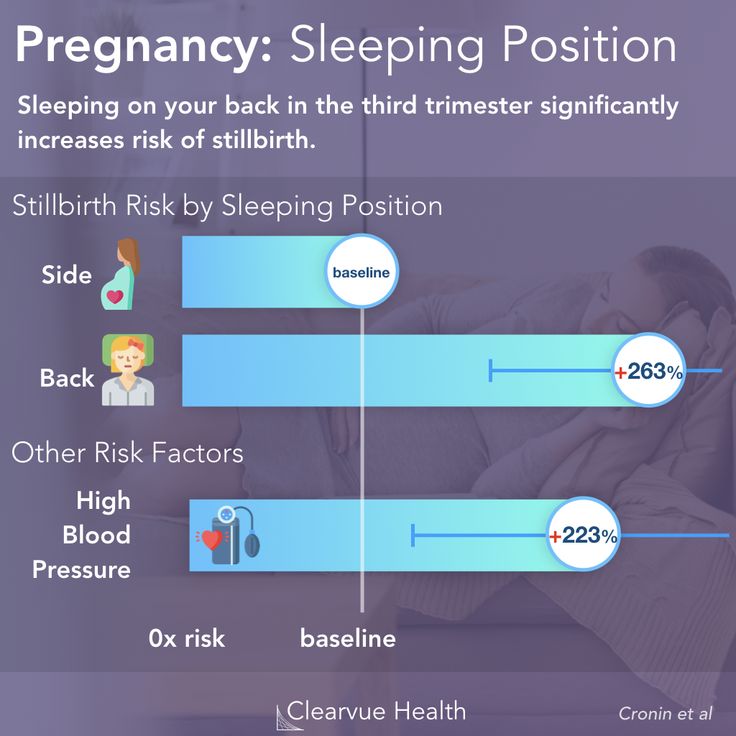
That is why doctors recommend sleeping on your side during pregnancy.
Interestingly, the fetus in the 2nd trimester becomes very active. There is still a lot of space in the uterus, so he moves intensively, flounders. If he does not like the position chosen by his mother, he reports this with rather tangible kicks. A woman must learn to “negotiate” with a child and choose sleeping positions that are comfortable for both of them. You can buy a special pillow for pregnant women, it literally saves many women.
How to sleep during pregnancy in the 3rd trimester: expert advice
Sleeping on your back during pregnancy in the third trimester is unacceptable, as well as in the second. The same goes for sleeping on your stomach. If a woman ignores these restrictions, the probability will increase:
- baby's hypoxia;
- compression of the inferior vena cava;
- frequent dizziness and fainting;
- breech or transverse presentation of a child;
- cord entanglement;
- arterial hypotension;
- limb edema, convulsions;
- back pain.
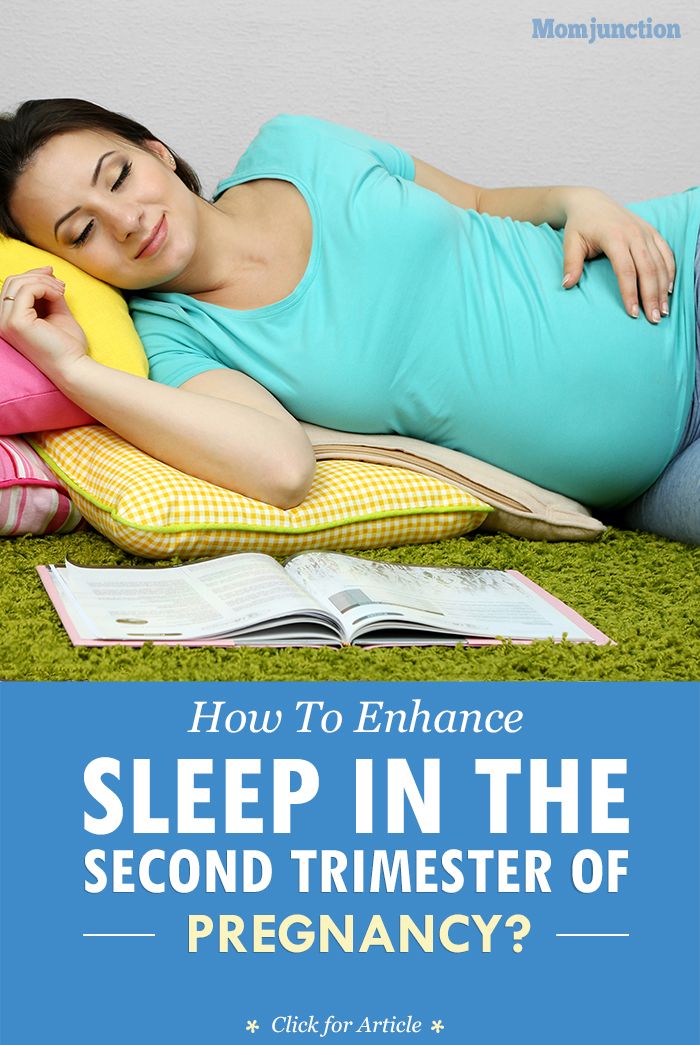
The only available sleeping position is on the side. However, not everything is simple here either. Scientists have found that the most correct position for sleeping during pregnancy is on the left side.
Why sleep on the left side is preferable
Sleeping on the left side has a number of advantages:
- helps to reduce the load on the circulatory system and internal organs of a woman;
- creates optimal conditions for the full work of the heart;
- prevents the reflux of gastric juice into the esophagus and minimizes the likelihood of heartburn;
- does not interfere with blood circulation in the placenta;
- prevents compression of the inferior vena cava.
Thanks to stable blood flow and normal heart activity, the pregnant woman feels better. The child's condition also remains stable - he does not suffer from hypoxia and nutritional deficiencies.
How much to sleep during pregnancy
For good health, you need not only to sleep in the correct position, but also to ensure that there is no sleep deficit .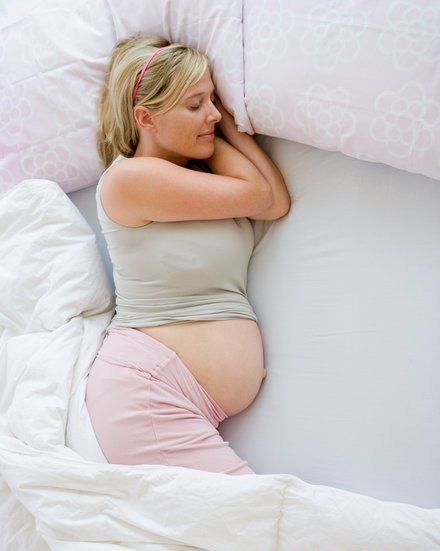 It is believed that the expectant mother should sleep at least 8-10 hours. That is how much time it takes for the body to recover.
It is believed that the expectant mother should sleep at least 8-10 hours. That is how much time it takes for the body to recover.
If sleepiness bothers you during the day, you need to find extra time for daytime sleep. It is unreasonable to fight the needs of your own body: it knows better what it needs in this difficult period.
Vitamins important for good sleep for the expectant mother
Insomnia during pregnancy is very common. It is far from always associated with the inconvenience caused by a growing belly. With a deficiency of certain vitamins and minerals, the nervous system cannot work normally, the sleep and wakefulness regime is disturbed. Then the pregnant woman cannot fall asleep for a long time in the evening, and wakes up tired and broken in the morning.
A person needs the following vitamins and minerals for good sleep:
- iodine,
- vitamin D3,
- thiamine (B1),
- riboflavin (B2),
- niacin (B3),
- zinc.
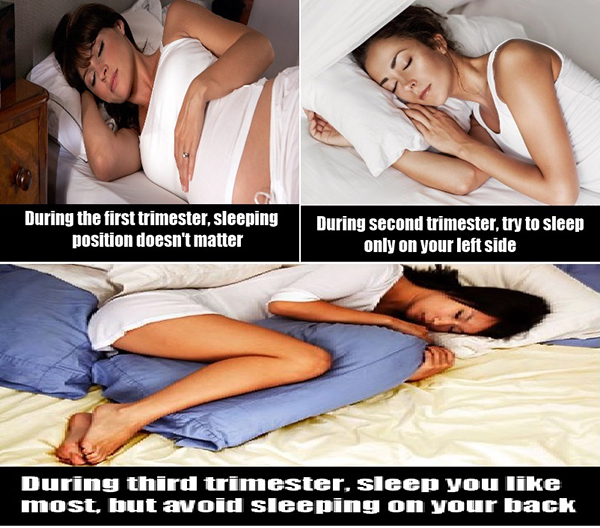
When they are lacking, the pregnant woman experiences lethargy, suffers from a breakdown. She does not have time to "charge" with energy overnight. He falls asleep badly, wakes up at the slightest noise, and then again cannot fall asleep for a long time. This negatively affects the general condition of the expectant mother.
This cause of poor sleep should not be brushed aside, since during pregnancy the consumption of certain vitamins and minerals increases several times, such an amount cannot be obtained from food. And most women enter pregnancy already with a deficiency of nutrients, such as iodine.
To prevent beriberi and not suffer from insomnia, you should take vitamin-mineral complexes for pregnant women. Try, for example, Pregnoton Mama. It contains all of the above vitamins in easily digestible forms, is well tolerated by pregnant women and has a high safety profile. It is convenient to take the complex, you only need one capsule per day. More information about Pregnoton Mama can be found here.